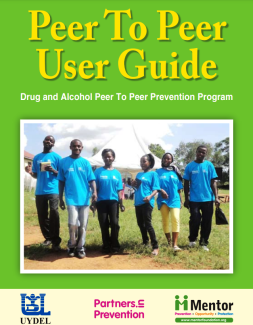Peer to Peer User Guide-Drug and Alcohol Peer to Peer Prevention Program

This guide is developed to facilitate the work of Peer Counsellors in training Peer Educators in substance abuse prevention. It is based on the experience from the peer to peer drug prevention programs conducted by UYDEL. This peer to peer guide provides a framework for all peers to help prevent drug abuse in areas/communities where they come from.
This guide presents the key areas/topics that are deemed essential in preventing and/or lowering drug and alcohol use in the East African Region.
This PPPP guide is intended to make certain that the necessary information, skills, methods and responses are available and known to a wide spectrum of both youths and other individuals responsible for change the community. In addition, this guide stresses the importance of alcohol and drug abuse prevention among young people by stressing the risk and protective factors that may or may not expose a young person to drug abuse and ways of avoiding them.
The concept of peer education provides a rationale and effective vehicle for using drug peer counselors as a major strategy in community based drug abuse prevention programs. Drug peer counselors are responsible for providing confidential addictions counseling, education and support to individuals, families and the communities experiencing addictions and for promoting health lifestyles and healthy choices.
This may include confidential individual, family or group counseling about the causes and effects of addictions support for families dealing with addictions and/or referrals to treatment for individuals requesting this opportunity.
As a social change agent, the peer counselor needs to be familiar with other services and resources in the community and work closely to provide information and support when required. That’s why this guide goes an extra step to give contacts of institutions where young people may seek alcohol and drug abuse counseling and rehabilitation services. This guide is organized in 3 sections namely; Section 1 focuses on background information on drug abuse and skills for peer to peer counseling; Section 2 emphasizes background information on peer to peer counseling and section 3 focuses on resources for peer to peer counseling. We wish you a successful
